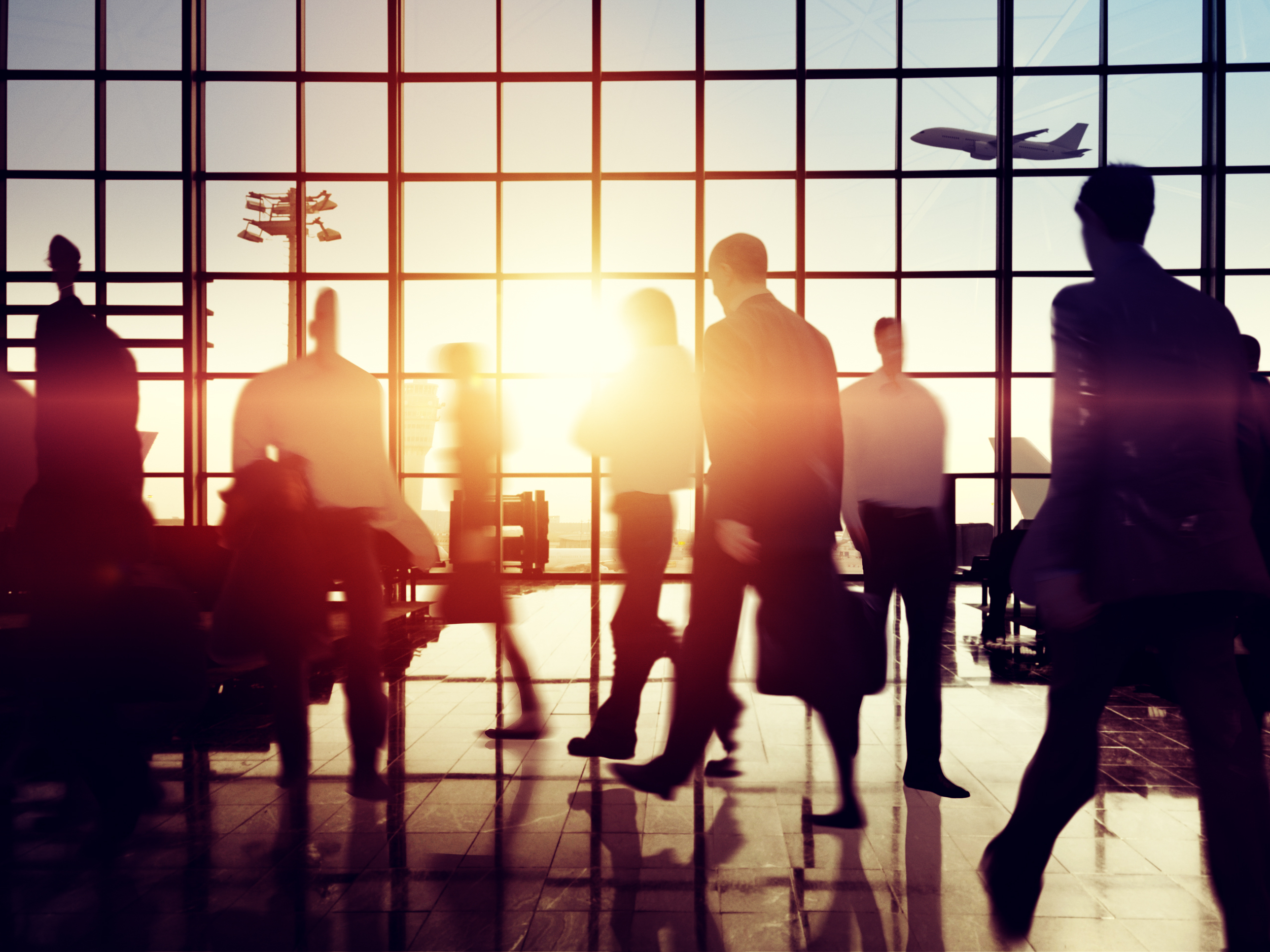- Companies such as Google, Facebook, and Salesforce have restricted or canceled business travel for their employees in response to the coronavirus.
- Airlines and hotels are becoming increasingly flexible with change and cancellation fees during the outbreak, according to Mike Volpe, CEO of corporate travel management company Lola.com.
- Here’s what you need to know about travel cancellations and refunds for planned business travel as well as how to stay healthy on the road.
- Visit Business Insider’s homepage for more stories.
As the coronavirus continues to spread, companies such as Google, Amazon, Salesforce, and Twitter have restricted employee travel and canceled conferences around the world.
On March 3, Google canceled its largest event of the year, the Google I/O developers conference. The conference, which was set to take place in Mountain View, California, is often where the company reveals new products coming to market, Business Insider’s Lisa Eadicicco reported.
Earlier in the day, Google sent a notice to employees barring them from international travel without special permission. Amazon, Twitter, and Salesforce have also suspended non-essential employee travel both abroad and within the US on February 28, March 1, and March 2 respectively.
The coronavirus, which originated in Wuhan, China, in late December, has infected over 94,000 people in 74 countries and killed 3,200 people as of March 4. At least 83 airlines around the world have canceled flights in response to the outbreak, and major hotel brands such as Wyndham and Hilton have temporarily shuttered 70% and 60% of their hotels in China.
If your company has restricted business travel, or if you plan to travel for business in the near future, here's what you need to know about cancellation fee waivers, refund policies, and staying healthy on the road:
Does my insurance cover travel cancellations and changes?
If you purchased travel insurance - whether through a credit card or separately - after late January 2020 when the coronavirus became a "foreseen" event, chances are your insurance won't cover coronavirus-related travel changes and cancellations.
"Each provider assigns a specific date to when they consider an event having a foreseeable impact on travel," Squaremouth, a travel insurance comparison company, notes on its website. "In regards to the coronavirus outbreak, this date ranges between January 21st and January 27th. This date may fluctuate based on a provider's threshold for when an event is considered known to the public."
On January 20, China began increasing security measures to contain the coronavirus, including airport temperature screenings. Three days later, the government placed Wuhan, the epicenter of the outbreak, under quarantine. By January 30, the World Health Organization declared the coronavirus a Public Health Emergency of International Concern following confirmation that it had spread to humans outside of China.
"All travel insurance providers are now considering the coronavirus outbreak as a foreseen event," Squaremouth notes. "This means there are limited, if any, benefits available relating to the outbreak."
Be sure to check the fine print of your travel insurance policy to see what is covered in the case of a public health emergency. Travelers may be eligible for benefits if they contract or are quarantined due to the coronavirus, depending on when they purchased their policy, but flights missed due to coronavirus screenings at airports are typically not covered, Squaremouth notes.
If you fall sick before a trip and are concerned about traveling with a weak immune system, a doctor's note may help you to earn trip-cancellation coverage, Ted Rossman, an industry analyst at CreditCards.com, told Business Insider's David Slotnick.
However, canceling a trip simply due to concern about the virus, likely won't earn you an insurance refund. "The only travel insurance that would be helpful in that scenario is when you pay extra for a 'cancel for any reason' plan," Rossman said.
"Cancel for any reason" (CFAR) coverage, which can be purchased as a policy add-on, is 40% more expensive than a typical travel insurance policy and reimburses up to 75% of trip costs if the policyholder cancels the trip two to three days before departure, Squaremouth explains. Most CFAR policies can be purchased within two to three weeks of the first trip payment, but offer more flexibility when it comes to cruise travel.
CDC alerts aren't typically covered by plans outside of CFAR, Squaremouth adds. States of emergency, such as the one issued by San Francisco in response to the coronavirus, may be "in some cases," a representative for SAP Concur, a corporate travel and expense management service, told Business Insider.
What about hotels and airlines?
"As the risks of COVID-19 become more pronounced, we've seen hotels and airlines be more flexible and proactive with their reimbursement policies, though this is not universal," Mike Volpe, CEO of corporate travel management company Lola.com, told Business Insider.
Business Insider's Slotnick has rounded up the current refund and rescheduling policies of major airlines, including Delta, American Airlines, Lufthansa, British Airways, Hawaiian Airlines, Alaska Airlines, and JetBlue, here.
"If you're scheduled to travel to a country with a confirmed outbreak, you may be able to cancel your trip and get a full refund," he wrote. While JetBlue doesn't fly to areas currently affected by the outbreak, it has waived change and cancellations for new reservations made between February 27 and March 11 for travel by June 1, 2020.
Some of the world's largest hotel chains are also waiving change and cancellation fees through March 31 for travelers who have booked in affected areas. Business Traveler maintains an up-to-date list of hotel cancellation and refund policies related to the coronavirus for Accor, Four Seasons, Hilton, Hyatt, IHG, Marriott, Radisson, Rosewood, Shangri-La, Peninsula, and Wyndham.
What if a business conference I planned on attending is canceled?
If you book a trip or arrive at a destination only to find that a conference is canceled, you may be able to be eligible to receive a refund for part of your trip or avoid cancellation fees.
"The conference cancellation is not a covered reason under standard waivers, but reservations may still have flexibility because of the greater global situation," Volpe said.
What happens if I booked through a third party?
If you booked or plan to book travel through a metasearch listings site such as Kayak, it is up to you to get in touch with individual companies to learn about cancellation and refund policies.
If you booked travel through a corporate travel management company such as Lola.com or TripActions, the company is can help you navigate changing policies of individual providers.
"Because all providers have different, and constantly evolving, policies about reimbursements and waivers due to COVID-19, Lola helps catalog this information and makes it accessible to customers as well as working directly with the providers when customers have specific questions," Volpe said.
Lola.com has published an article with information related to travel in the era of the coronavirus. TripActions has done the same, and on March 3, launched new "duty of care" features for clients, a representative told Business Insider. These include a real-time report with coronavirus news and updates as well as the ability to blacklist countries and continents for bookings.
How do I stay up-to-date on policies and coronavirus alerts?
Business Insider's news team is continuously updating a list of everything we know about new cases and affected areas here. The CDC and US Department of State currently recommend avoiding or reconsidering travel to five countries affected by the coronavirus outbreak - Italy, Iran, South Korea, China, and Japan - and maintains an updated list of travel advisories here.
With regard to flight and hotel polices, Volpe recommends that you keep checking in with either your corporate travel management company or individual providers. "The cancel and refund policies are changing frequently, and if your plans are possibly going to need to be amended, you may fall under a waiver if you have some patience and don't cancel right off the bat!" he said.
How do I protect myself while on the road?
The CDC's guidelines for the prevention and treatment of coronavirus include washing your hands frequently, for 20 seconds at time, and refraining from touching your nose, eyes, and mouth. The CDC does not recommend wearing a face mask unless you are a medical professional or have contracted the virus.
See the Business Insider's day-by-day breakdown of coronavirus symptoms and guidance on how to recognize them.

